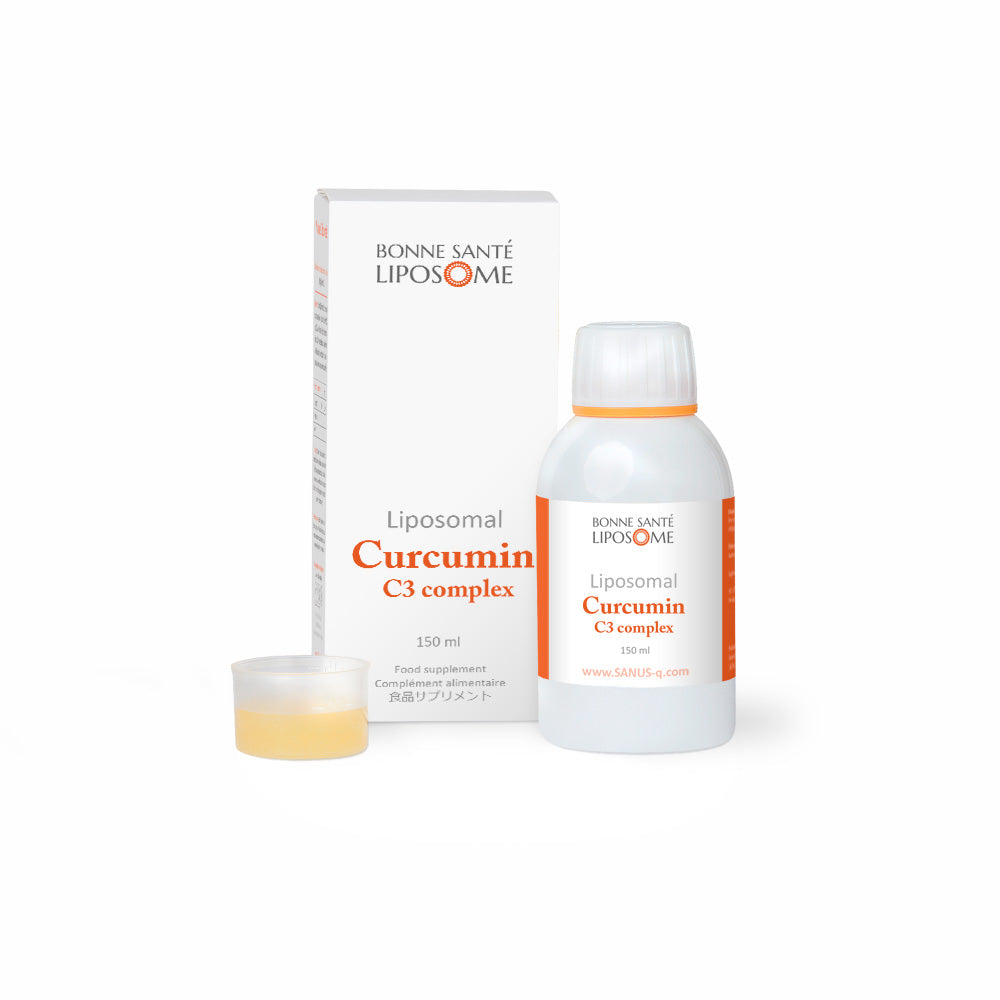Bonne Santé Liposome: Liposomal Curcumin C3 Complex - 150ml
Liposomal Curcumin for anti-inflammatory and pain-relieving benefits
Current batch best before date: Product discontinued
(Check our current promotions before buying)
Contains: (per 5 ml) 170 mg Curcumin C3 complex®
Suggested dosage: 1 x 5 ml directly in mouth or glass of water or juice, unless otherwise advised by a healthcare professional. Do not exceed recommended dosage.
Ingredients: Curcumin C3 complex® (95% curcuminoids extract from Curcuma longa); lecithin (Non-GMO SOY) - emulsifier; glycerol - humectant; ethanol <4.2%; natural vitamin E (as d-alpha tocopherol) - antioxidant; potassium sorbate - preservative; purified water.
Recommended serving size: 5 ml
Servings per bottle: 30
Storage: Store cool and dry. When opened store in refrigerator and finish within 2 months.
Product description PDF: View Here
Product Description
- 150 ml Curcumin
- Liposomal Curcumin for increased bio-availability and absorption
- Non-GMO product
- Measuring cup included
- Resealable screw top lid
Liposomal Curcumin Health Benefits
- Supports heart health
- Improves liver functions
- Improves cognitive abilities
- Helps in diabetes management
- Protects from radiation damage
- Anti-oxidant and anti-inflammatory
- Reduces joint pain and inflammation
- May reduce the risk of developing diabetes
Why do you need Curcumin?
Curcumin is the main bioactive ingredient found in turmeric – a golden yellow spice that is known for its anti-inflammatory and healing properties. In India, turmeric is used as a kitchen spice that gives curry its typical yellow color. It has also been used as an Ayurvedic medicine for thousands of years to treat a wide range of health issues – including skin problems, poor digestion, inflammatory bowel disorder, poor liver function, joint pain, asthma and cough. In Ayurveda, it is believed to purify blood, heal external and internal wounds, and support the health of liver, skin, lungs, joints and digestive system.
Oxidative damage and inflammation are known to be the root cause of many chronic ailments. And emerging research show that curcumin may help in reducing oxidative stress, inflammation and pain in various conditions due to its tremendous anti-oxidant and anti-inflammatory properties.
Anti-oxidant properties
Free radicals cause oxidative damage to proteins, DNA and lipids. This can result in a wide range of diseases. Curcumin works in a lot of ways to improve the body’s anti-oxidant capacity. [1]
- Scavenges different forms of free radicals
- Increases activities of antioxidant enzymes such as superoxide dismutase (SOD), glutathione peroxidase (GSH) and catalase
Anti-inflammatory properties
Curcumin is known to supress inflammation through various mechanisms [2] [3]. Inflammation is a complex mechanism and involves all kinds of proteins, enzymes, transcription factors (proteins that turn genes on and off) and cytokines. Curcumin reduces inflammation by blocking the activity of these molecules. Most importantly, it works as a NF-κB blocker. Nuclear factor-kappa B is group of proteins that regulate inflammatory responses and are involved in the development of many chronic diseases.
Both these mechanisms play a central role in how curcumin may control inflammation and oxidative damage. This is how using curcumin supplements may be a useful strategy in the prevention, as well as the management, of conditions such as diabetes, metabolic syndrome, heart disease, arthritis, cancer and even Alzheimer’s. New studies have also highlighted the ability of curcumin to kill cancer cells, but more extensive research is needed to definitively support that observation.
1. Heart disease
- Lowers inflammation and oxidation, key drivers of atherosclerosis and heart disease
- Improves functions of endothelium [4] – a layer of cells that line the internal surface of the blood vessels. Endothelium plays a key role in regulating blood pressure and formation of blood clots. A healthy endothelium also reduces the risk of plaque formation in the arteries.
- Prevents blood clotting, reducing the risk of heart attack or stroke.
2. Osteoarthritis and Rheumatoid Arthritis
- Improves pain and joint functions in osteoarthritis and rheumatoid arthritis.
- May even work better than anti-inflammatory drugs to improve symptoms like joint tenderness and swelling. [5]
- Improves quality of life
- Reduces dependency on conventional drugs to reduce pain
3. Type 2 Diabetes
- Helps manage and even prevent type 2 diabetes [6]
- Lowers blood sugar levels and improves insulin resistance in type 2 diabetics
- Stimulates insulin secretion
- Protects beta cells of pancreas from oxidative damage, and reduces the risk of developing diabetes in people with high risk [7]
- Provides better results when used with metformin, a drug which is commonly used to manage diabetes. [8]
- May improve diabetes related complications
4. Radiation damage
- Protects healthy cells from oxidative damage caused by radiation
- Stimulates the production of antioxidant enzymes that further protects cells and DNA from oxidation and resulting damage
- Causes cancerous cells to die
- Improves success of conventional cancer treatments when used as an adjunct
Other health benefits of Curcumin
- Improves liver functions and treats different types of liver diseases [9]
- Lowers exercise-induced inflammation and muscle soreness [10]
- Helps in anxiety and depression
- Improves memory and mood [11]
- May delay the progression of Alzheimer’s
Bonne Sante Liposome Curcumin
There is no doubt that curcumin offers an impressive array of health benefits. But its efficiency is marred by poor absorption and bioavailability, and fast metabolism in the body. This makes most curcumin supplements a poor choice if you are looking for natural ways to reduce pain and inflammation, support overall health and to prevent risk of chronic diseases.
Liposomal curcumin supplements, however, can improve bioavailability and absorption rate. In liposomal supplements, the nutrient is encapsulated within small-sized spheres called liposomes. These ‘bubbles’ provide a very efficient way of delivering the nutrient to the cells, entirely bypassing the gastric route. This delivery system ensures there is no loss of nutrients that typically takes place during digestion, allowing your body to reap more benefits than from non-liposomal curcumin supplements.
References:
- Hewlings et al. Curcumin: A Review of Its’ Effects on Human Health. Foods. 2017.
- Panahi et al. Effects of curcumin on serum cytokine concentrations in subjects with metabolic syndrome: A post-hoc analysis of a randomized controlled trial. Biomed Pharmacother. 2016
- Shehzad A et al. Multifunctional Curcumin Mediate Multitherapeutic Effects. J Food Sci. 2017
- Oliver et al. Novel Form of Curcumin Improves Endothelial Function in Young, Healthy Individuals: A Double-Blind Placebo Controlled Study. Journal of Nutrition and Metabolism. 2016.
- Ghorbani et al. Anti-Hyperglycemic and Insulin Sensitizer Effects of Turmeric and Its Principle Constituent Curcumin. Int J Endocrinol Metab. 2014
- Chuengsamarn S et al. Curcumin Extract for Prevention of Type 2 Diabetes. Diabetes Care. 2012.
- KSN Maithili et al. Efficacy of Turmeric as Adjuvant Therapy in Type 2 Diabetic Patients. Indian J Clin Biochem. 2015
- SF Nabavi. Curcumin and Liver Disease: from Chemistry to Medicine. Comprehensive Reviews in Food Science and Food Safety. 2014.
- BK et al. Reduced inflammatory and muscle damage biomarkers following oral supplementation with bioavailable curcumin. BBA Clin. 2016
- Small et al. Memory and Brain Amyloid and Tau Effects of a Bioavailable Form of Curcumin in Non-Demented Adults: A Double-Blind, Placebo-Controlled 18-Month Trial. The American Journal of Geriatric Psychiatry. 2018






 Pin it
Pin it